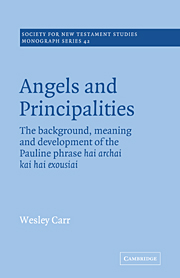 Angels and Principalities
Angels and Principalities Book contents
- Frontmatter
- Contents
- Preface
- Abbreviations
- General Introduction
- PART 1 The Background to Paul's Thought on the Powers
- PART 2 Exegesis of Pauline Texts
- PART 3 The post-Pauline development
- 6 Texts within the New Testament
- 7 Ignatius of Antioch
- 8 The angelomorphic Christology of early Jewish Christianity
- 9 The Greek apologists
- 10 Clement of Alexandria
- 11 The influence of gnosticism
- 12 Origen
- Conclusion to Part 3
- PART 4 Final Remarks
- Notes
- Select Bibliography
- Index
7 - Ignatius of Antioch
Published online by Cambridge University Press: 06 January 2010
- Frontmatter
- Contents
- Preface
- Abbreviations
- General Introduction
- PART 1 The Background to Paul's Thought on the Powers
- PART 2 Exegesis of Pauline Texts
- PART 3 The post-Pauline development
- 6 Texts within the New Testament
- 7 Ignatius of Antioch
- 8 The angelomorphic Christology of early Jewish Christianity
- 9 The Greek apologists
- 10 Clement of Alexandria
- 11 The influence of gnosticism
- 12 Origen
- Conclusion to Part 3
- PART 4 Final Remarks
- Notes
- Select Bibliography
- Index
Summary
In a recent survey on early Anatolian Christianity, S. E. Johnson concludes with these remarks:
‘But there is one baffling question, though it pertains to Syria rather than to Asia Minor: the origin of Ignatius of Antioch, and how he developed his point of view. Like so many creative persons, like his hero St. Paul, he is a mystery. He appears almost like Melchisedek, without father or mother or genealogy or beginnings, though we think we do know his end. Certainly he is another example of an oriental alienated from the prevailing culture.’
This is a useful reminder that we know virtually nothing of the development of Christianity at Antioch until Ignatius appears and that we know almost as little after his departure until late in the second century. We may, however, be certain of this: Ignatius' understanding of the gospel is fundamentally Pauline. He does not pedantically recount Paul's views, but thinks for himself, although Johnson's epithet ‘creative’ may be generous. Now that we may be reasonably sure that we are dealing with authentic texts from the early second century, we have in these letters writings that, while, coming from western Syria, are addressed to Christian communities in Asia Minor on the certain assumption that they will be understood. These writings also have points of contact with certain forms of expression and ideas that are found among later gnostic writers, and at the same time they stand within the Pauline and Judaeo-Christian traditions.
- Type
- Chapter
- Information
- Angels and PrincipalitiesThe Background, Meaning and Development of the Pauline Phrase hai archai kai hai exousiai, pp. 136 - 142Publisher: Cambridge University PressPrint publication year: 1981


